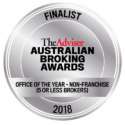What is an investment property loan?
An investment property loan is a loan which has been obtained to purchase an investment property or where the property securing the loan is used for investment purpose.
In contrast to a loan used to purchase your principal place of residence, investment property loans in Australia carry a higher interest rate and have a lower loan-to-value ratio (LVR) limit.
For example, many lenders in Australia will allow individuals wanting to purchase their own home to borrow up to 95% of the property’s value, whereas an investment property loan is mostly limited to 90% of the property’s value.
How do investment property loans work?
Investment property loans work in much the same way as every other type of loan, where a sum of money is borrowed and needs to be repaid with interest in regular, often monthly, instalments. In the case of investment property loans, the purpose of the loan is purchasing or refinancing an investment property, or where the property securing the loan (the mortgaged property) is used for investment purposes.
Repayments on an investment property loan can be either principal and interest (where the repayment amount includes the interest expense and an amount to repay the principal borrowed) or interest only repayments (where only the interest amount is covered in the repayment).
Interest only terms are usually limited to an initial period of up to five years when the loan would then revert to repayments of principal and interest.
As a standard mortgage is for a period of 30 years, if the first five years of loan repayments are interest only, this leaves only 25 years for the lender to receive the repayment of the original loan principal. The principal and interest repayments over the remaining 25 years are higher than they would have been if principal and interest repayments had been made from the start (ie the full 30 year period).
The deposit for an investment property loan could be made with cash savings, or equity in an existing property could be used to provide additional security on the loan allowing the individual to borrow a higher amount. In some cases where equity in another property is used, a borrower may borrow 100% of the investment property purchase price plus any associated costs, such as stamp duty.
When purchasing an investment property, the actual or proposed rental income that it will generate can be included as income on the investment property loan application, however lenders will not include the full rental income amount to allow for any short term tenant vacancies and some of the costs associated with the owning and maintaining the investment property, such as agent fees, body corporate fees, council rates, and maintenance costs.
Any ongoing rent, board, or home loan repayments for your current primary place of residence will be included on the loan application as an expense, and in the case where you are living with parents or family/friends for free, most lenders will include a nominal allowance for rent/board.
Investment property loans are usually separate loan accounts to other home loans for accounting purposes, as investment property loans are treated differently to loans for your own home when it comes to taxation.
Types of investment property loans
Fixed rate loans: These loans have an interest rate that remains the same for a set period, usually 1 to 5 years. This allows for certainly around monthly payments for the fixed term. At expiry of the initial fixed rate term borrowers can choose to either re-fix their interest rate at the current fixed interest rate at the time or roll it onto the current variable rate offered.
Variable rate loans: These loans have an interest rate that can change over time. This can lead to lower initial interest rates compared to a fixed rate loan, but it can also lead to unpredictable monthly payments. A loan can also be split with both a fixed rate and a variable rate.
Home loan repayment types
Principal and interest home loans: A home loan with principal and interest (or P&I) repayments is one where you pay back the money you borrowed from the lender – also referred to as the ‘principal’ of the loan – at the same time as you pay off the interest your lender charges you. This means the amount you repay each week, fortnight or month is likely to remain stable throughout your loan, unless your lender changes your interest rate or ongoing fees.
Interest-only home loans: Interest-only (IO) home loans are loans in which only the interest portion is paid off, not the principal, for the first one to five years of a loan, before the loan reverts to P&I repayments. As a result, your repayments may be cheaper initially but are likely to go up substantially once you start paying off the principal component. In Australia, this type of loan is generally more suited to property investors than people buying a home to live in, although it may also be attractive to people who want cheaper initial repayments on their first home.
Choosing the right investment property loan?
There are several factors you should consider when choosing the right investment property. The most important place to start in choosing the right investment property loan is having a clear understanding of your needs, requirements, and priorities. This will help in matching you with a loan product which has the features and qualities that best meet your requirements.
While a competitive interest rate will always be an important consideration, there are other things to consider:
Will you have savings available either as a lump sum or accumulating over time?
If so, an offset account feature could be important to you.
Are you needing certainty of repayment?
If so, a fixed rate loan may provide a better match than a variable rate loan.
How long are you intending to hold the property for?
If you intend to sell the property in a year or two, a longer-term fixed rate loan may not be suitable as it could carry expensive break costs.
Is minimising holding costs important, so you can divert excess funds to other areas or investments?
If yes, then an interest only repayment term might work best.
Are you planning to sell or acquire additional property?
You will need a loan product with the flexibility to enable you to restructure with minimum hassle and expense.
Finding a loan which has the features you need and is optimally structured to suit you requires looking at your unique circumstances, plans and goals, and then reviewing the available lenders and products to discover who provide the best fit.
A qualified mortgage broker will be able to assist you in choosing the right investment loan for your needs.





